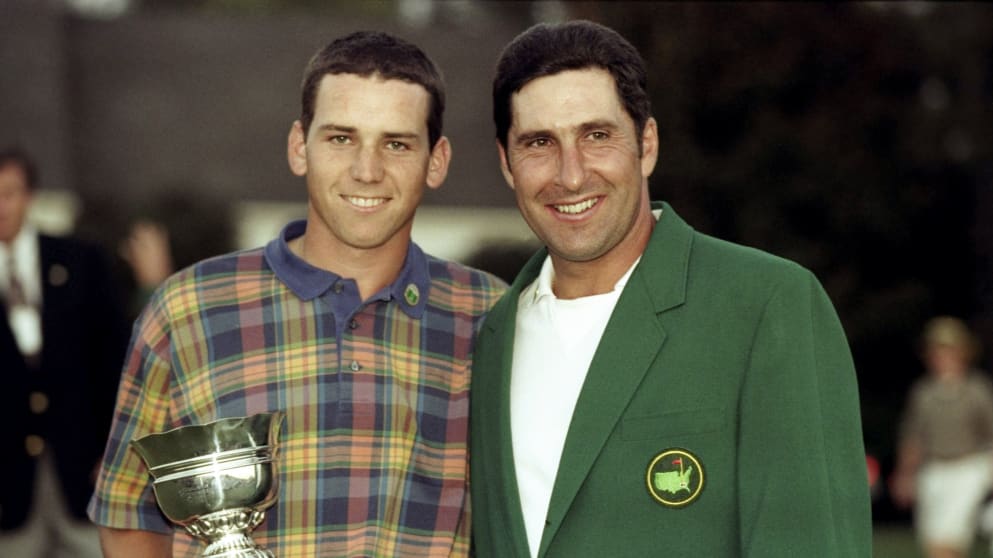Seve Ballesteros, José María Olazábal…Sergio Garcia: the heir apparent has finally fulfilled his destiny.
From the iconic moment that youthful Spaniard emerged from behind a tree and bounded up the fairway at Medinah in the 1999 US PGA Championship, Garcia had been feted as a Major Champion in waiting. And waited he has. A further 69 Major championships, in fact, since he finished runner up to Tiger Woods in Chicago.
On April 9 2017, the day one of his golfing idols, the late Ballesteros, would have turned 60, the stars eventually aligned for Garcia in Georgia, and Spain finally had another Major Champion, another Green Jacket.
“To do it on Seve’s 60th birthday and to join him and Olazábal, my two idols in golf my whole life, it's something amazing,” said Garcia. “José sent me a text on Wednesday night telling me how much he believed in me. And what I needed to do. And just pretty much believe in myself.”
Like Ballesteros before him, Garcia displayed obvious talent from an early age, taking up the game at the age of three under the careful tutelage of his father victor, a club professional in Spain. Young Sergio won his club championship aged just 12 and four years later he became the then youngest player to make the cut at a European Tour event in the 1995 Turespaña Open Mediterranea. Land of Valencia, aged 15 years and 46 days.
Victory in the 1998 Amateur Championship earned Garcia a first invitation to the Masters Tournament in 1999 when he shared a practice round with both Ballesteros and Olazábal, wisely picking the brains of his compatriots who already had three Green Jackets between them at that point.

Olazábal would go on to swell that number to four that week, and initially, Garcia felt Augusta National offered him an enticing opportunity to one day join Spain’s elder statesmen in the pantheon of Major Champions. Yet over time that feeling diminished, with eighth place in 2002 and tied fourth position two years later the nearest he came to the Green Jacket, before he ultimately ‘found peace’ with the course.
“When I came here in 1999 as an amateur, I felt like this course was probably going to give me at least one major,” he said in the Butler’s Cabin, before he received the Green Jacket from 2016 winner Danny Willett. “I'm not going to lie, that thought kind of changed a little bit through the years, because I started feeling uncomfortable on the course. But I kind of came to peace with it the last three or four years, and I accepted what Augusta gives and takes. And I think because of that, I'm able to stand here today.”
During those ‘uncomfortable’ years at Augusta, it was the other Major Championships which seemed of present Garcia with a more viable route to Major success, with that second place behind Woods at Medinah in 1999 followed by three further runner up finishes in Majors, in The Open Championship in 2007 – when he lost to Padraig Harrington in a play-off - and 2014, as well as the US PGA Championship in 2008, alongside a string of other top ten finishes, including five in the U.S. Open.
While Majors continued to prove elusive, significant victories elsewhere on the world stage did go his way – including the Players Championship on the US PGA Tour in 2008 and the HSBC Champions in 2009 – while Garcia also forged a reputation as one of Europe’s most passionate and fearless Ryder Cup players, a mantle he also inherited from Ballesteros and Olazábal, the pioneering pairing he had watched conquer the Americans as a youngster.
In 1999, aged 19, Garcia had become the youngest player to represent Europe in the biennial contest, and after a further four appearances, he took on the role of vice-captain in Wales in 2010 after slipping down the world rankings, before a return to winning ways on the European Tour the following year earned him a place in the team when Olazábal’s took on the captaincy.
Fittingly, the pair united at Medinah, the scene of Garcia’s first near miss in a Major, in 2012, the year after Ballesteros lost his battle with cancer, and together, Garcia, Olazábal and Team Europe channelled the spirit of Seve to pull off one of sport’s greatest comebacks. Five years on, it somehow seemed fateful once more that on Ballesteros’ birthday, Garcia would finally make his Major breakthrough following an epic encounter with another protagonist of the Miracle of Medinah, Englishman Justin Rose.
As if there weren’t already enough signs to suggest that it might be Garcia’s time, after dropping two shots back during the final round, he eagled the 15th hole to return to the top of the leaderboard alongside Rose. The last player to make three on that hole en route to victory? Olazábal in 1994, of course.
There would be one more scare on Garcia’s journey, as he missed his chance to seal victory on the final hole in regulation play, but when the pair – the friends - returned down the 18th hole one more time, Garcia was at last to fulfil his destiny, as he watched his 14ft birdie putt curl agonisingly around the cup, before finally dropping.
Happier than ever off the course, more mature on it, at 37, Garcia had paid his dues and his moment had finally arrived. Seventy-three previous Major championships worth of frustration was let out in one primal scream, before he dropped to the ground and beat his fist into the hallowed turf of Augusta National, the venue he will now return to for the remainder of his life.
As he slipped into the Green Jacket, Garcia joined that most elusive of clubs, an institution which did have two Spanish members, and now has three.
Movingly, Olazábal had sent him a note of encouragement earlier in the week which clearly had a profound effect.
“He did mention a couple of things that kind of touched my heart a little bit,” said Garcia. “He said, "I'm not sharing my locker at the moment, and I hope that I get to do it with you. So if you guys wouldn't mind putting me with José, it would be great.
“He's a great man and we've had a great relationship for many, many years. To be able to join him and Seve as Masters Champions from Spain, it's unbelievable.”







